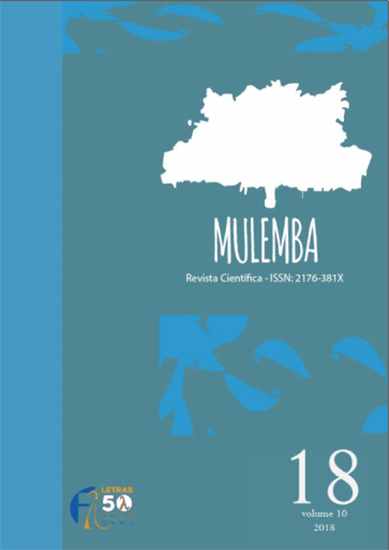Reeducation camps in Mozambique: the fictionalization of history and memory in ‘Campo de trânsito'
DOI:
https://doi.org/10.35520/mulemba.2018.v10n18a15704Keywords:
Reeducation camps. Mozambique. Memory.Abstract
Campo de Trânsito (2007), novel by the Mozambican author João Paulo Borges Coelho, fictionalizes the facts and abuses lived in the feared “reeducation camps”, institutionalized in the post-independence by the Mozambican State, aiming to withdraw from the society those who were not prepared to be a part of the new nation system and reeducate them so they could become productive citizens aligned with the government model of socialist Marxist-Leninist orientation. This text goes from fictional to the History of Mozambique, tracking the abuses committed against citizens, such as the denial of the fundamental rights of the human being, restricting the freedom from a good part of the civilians, creating a society divided by fear, in the implementation of a totalitarian regime. From what they called “Cleaning Operation”, the ideal of liberty for all that was defended in the anti-colonial struggle was postponed, giving place to a fearful nation, frightened by the ghost of the so called reeducation camps. The memory issue is emphasized in the rebuilding of the social structure transposed to the fictional, reflecting, on the historical past, the present postcolonial time.
Downloads
References
BORGES COELHO, Joao Paulo. Campo de Trânsito. Editorial Caminho.Lisboa,2007.
BEZERRA, Rosilda Alves; Souza, Francisca Zuleide Duarte. A (re) construção identitária em Entre as memórias silenciadas, de Ba Ka Khosa. In: Literatura e outras Artes: construção da Memória em Angola e Moçambique. (Org) Ineke Phaf-Rheinberger/Ana Sobral/Tânia Macedo/Selma Pantoja. Peter land Edition. Alemanha, 2017.
CAN, Nazir Ahmed. Para além da história: Campo de Trânsito, de João Paulo Borges Coelho. In: Revista Via Atltântica.n.16, Dez/2009.
CHAVES, Rita. Entrevista com João Paulo Borges Coelho. Revista Via Atlântica. N. 16. Dez/2009, pp. 151-166.
GARCIA CANCLINI, Néstor. A globalização Imaginada. São Paulo: Iluminuras, 2007.
LEVI, Primo. É isto um Homem? Tradução de Luigi Del Re. Rio de Janeiro, Rocco,1988.
MATTE BRAUN. Ana Beatriz. O “outro” moçambicano: expressões da moçambicanidade em João Paulo Borges Coelho. Tese de Doutorado do Programa de Pós-Graduação em Letras. Universidade Federal do Paraná. Curitiba, 2016.
MENEZES, Maria Paula. Nação e Narrativas Pós-coloniais: interrogações em torno dos processos identitários em Moçambique. In: Nação e Narrativa Pós-colonial. Ensaios. Org. Ana Mafalda Leite, Hilary Owen, Rita Chaves, Lívia Apa. Lisboa: Edições Colibri,2012.
NORA, Pierre. Entre memória e história: a problemática dos lugares. Projeto História. São Paulo.n.10 Dez. 1993. p. 27-28.
PAREDES, Marçal de Menezes. A construção da identidade nacional moçambicana no pós-independência: sua complexidade e alguns problemas de pesquisa. In: Revista Anos 90, Porto Alegre, v.21, nº40, p.131-161,2014.
SANTOS LIMA, Rainério dos. Memórias indesejadas: os campos de reeducação na ficção de Ungulani Ba Ka Khosa. Revista Eletrônica Literatura e Autoritarismo. Dossiê n.18 - ISSN:1679-849X.Universidade Federal de Santa Maria. Santa Maria.RS.2017.
SELIGMANN-SILVA, Márcio. História, Memória e Literatura: O testemunho na era das catástrofes. Campinas, São Paulo. Editora da UNICAMP. 2003.
KI-ZERBO, Joseph. Para quando a África? Entrevista com René Holenstein.Tradução de Carlos Aboim de Brito. Rio de Janeiro: Pallas, 2006.
Downloads
Published
Issue
Section
License
Authors who publish with this journal agree to the following terms:
- Authors retain copyright and grant the journal right of first publication with the work simultaneously licensed under a Creative Commons Attribution License that allows others to share the work with an acknowledgement of the work's authorship and initial publication in this journal.
- Authors are able to enter into separate, additional contractual arrangements for the non-exclusive distribution of the journal's published version of the work (e.g., post it to an institutional repository or publish it in a book), with an acknowledgement of its initial publication in this journal.
- Authors are permitted and encouraged to post their work online (e.g., in institutional repositories or on their website) prior to and during the submission process, as it can lead to productive exchanges, as well as earlier and greater citation of published work (See The Effect of Open Access).

